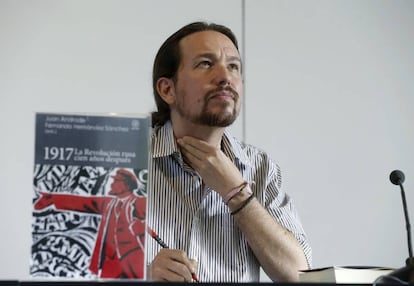Maduro’s accomplices
Unidos Podemos can no longer defend Venezuela’s slide into authoritarianism

This Sunday, unless the combined pressures of international diplomacy and domestic protests prevent it, Venezuela will cross the last red line that separates a democracy from a dictatorship.
The moment that the regime of President Nicolás Maduro validates the fraudulent and anti-constitutional election of members to the so-called National Constituent Assembly, it will have dissolved the last democratic institution remaining in the country, the National Assembly, whose members were elected in the polls of December 6, 2015. That election, we should remember, was won by the opposition to Maduro, represented by the MUD Democratic Unity Round-table, whose candidates scored a spectacular victory, given the adverse circumstances under which they campaigned, garnering 56.2% of the vote and giving MUD 112 out of the 167 seats in the National Assembly.
Since then, the Maduro regime has stripped the legislative body of powers. The result of this demolition job, carried out with the support of the Supreme Court – staffed by Maduro with tame judges – is a country robbed of any meaningful democracy. The National Assembly, the legitimate representative of the Venezuelan people, has no power, no control over the government and cannot approve the budget or state spending; in other words, none of the things it was created to do in the first place.
The government of Maduro changes the rules whenever it suits, at the same time locking up politicians and repressing any kind of opposition
To make matters worse, taking advantage of its control over the National Electoral Council, the regime has employed all kinds of chicanery to prevent the opposition from calling a recall referendum, a procedure guaranteed by article 72 of the 1999 Constitution. Violating the Constitution set up under former president Hugo Chávez, Maduro, his successor, called an election to select members of the National Constituent Assembly, which, according to articles 347 and 348, require approval via a referendum, not a rigged poll that excluded the opposition and provided no guarantees whatsoever.
The democratic opposition in Venezuela is now trapped in an impossible situation. After having accepted the rules of the Chavista game, it now finds that the government of Maduro changes them whenever it suits, while at the same time locking up politicians, as well as repressing any kind of opposition. The 498 prisoners of conscience that the Organization of American States says are being held in Venezuela, along with more than 100 deaths in street protests, leave no doubts as to what the regime in Caracas thinks about democracy and human rights.
Meanwhile, the leadership of anti-austerity party Unidos Podemos, which never stops talking about the need to reform Spain’s democratic system, remains silent on events in the South American country, or justifies Maduro while accusing the opposition of being anti-democratic.
Podemos urgently needs to make clear if its standards of democracy are the same as Maduro’s. This isn’t a rhetorical question. Spanish voters have the right to know what to expect if Podemos were to govern this country and they decided to oppose its policies. Would they be treated in the same way as people defending democracy from the authoritarianism of Maduro in Venezuela?
English version by Nick Lyne.
Tu suscripción se está usando en otro dispositivo
¿Quieres añadir otro usuario a tu suscripción?
Si continúas leyendo en este dispositivo, no se podrá leer en el otro.
FlechaTu suscripción se está usando en otro dispositivo y solo puedes acceder a EL PAÍS desde un dispositivo a la vez.
Si quieres compartir tu cuenta, cambia tu suscripción a la modalidad Premium, así podrás añadir otro usuario. Cada uno accederá con su propia cuenta de email, lo que os permitirá personalizar vuestra experiencia en EL PAÍS.
¿Tienes una suscripción de empresa? Accede aquí para contratar más cuentas.
En el caso de no saber quién está usando tu cuenta, te recomendamos cambiar tu contraseña aquí.
Si decides continuar compartiendo tu cuenta, este mensaje se mostrará en tu dispositivo y en el de la otra persona que está usando tu cuenta de forma indefinida, afectando a tu experiencia de lectura. Puedes consultar aquí los términos y condiciones de la suscripción digital.








































